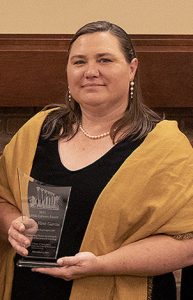
Sherry Flint-Garcia (PhD Genetics Area Program ‘01) is a research geneticist and lead scientist with USDA and adjunct professor of Plant Science and Technology. In her lab, the research focus is on genetic diversity of maize and the impact of artificial selection on protein and amino acid composition of the kernels. She earned her PhD at Mizzou in the interdisciplinary Genetics Area Program, of which many CAFNR faculty are affiliated.
She has received grant funding from the National Science Foundation (NSF) and USDA National Institute of Food and Agriculture (NIFA) on major initiatives that determine maize adaptability across latitude and high elevation in Mexico and the Andes Mountains in South America. Sherry has been invited to present her research across the United States, as well as in Mexico, Switzerland, France and Japan.
In 2021, she received the College of Agriculture, Food & Natural Resources’ Column Award for Distinguished Alumni, the only award specifically for alumni presented by the college. The awardee class includes one graduate from each of CAFNR’s six divisions, reflecting the six historic columns at the University of Missouri.
In honor of Women’s History Month, we asked Sherry a few questions about her distinguished career, women who have inspired her along the way, and how she is supporting the next generation of women in her field.
Tell us about your current or most recent role and what you enjoy about it
I am a Research Geneticist with the USDA Agricultural Research Service, and I have been conducting corn genetics and breeding research in this position since 2006. One aspect of my job that I really enjoy is that my research program is applied – there must be a connection to producers and consumers, no matter how remote that connection may feel while conducting our scientific experiments. Another aspect that I appreciate about this position is that I decide the direction of my research program and that I can reinvent my research regularly as I write five-year project plans and seek out grant funding to support the research.
Share with us a woman who has inspired you in your life/career
I come from very a hard-working farm family, where my parents raised seven children, worked the dairy farm, and tended a large vegetable garden. One very inspirational event that formed my love of plant science was when Mom channeled a small natural spring from our hillside to water the garden using furrow irrigation. This was just one example of how she creatively used the limited resources available to solve a problem.
How do you strive to set an example for the next generation of women leaders?
Traditionally plant breeding has been a very male-dominated industry and it has been hard for women to break through. Luckily this is changing in a positive direction; there are now many successful female plant breeders in the public and private sectors who serve as examples for the next generation. I try to show young women that they can succeed in anything they wish to do, be it career or personal life, or both. If we can’t succeed in one or the other, how can we succeed in both? I strive for authenticity in my own life and I support people in my group to develop their own personalities and careers, and to have pride in the decisions they have made.
What advice do you have for women entering your industry?
One of the hardest things for women in science is balancing work and family. Women are still generally the primary caregiver, the default person to care for children on snow days or sick days, or to bring children for appointments or to participate in special events. It is critical for women in science to find a supportive network of supervisors/coworkers and friends that will provide the needed flexibility or who can help deal with those unexpected changes with family situations.